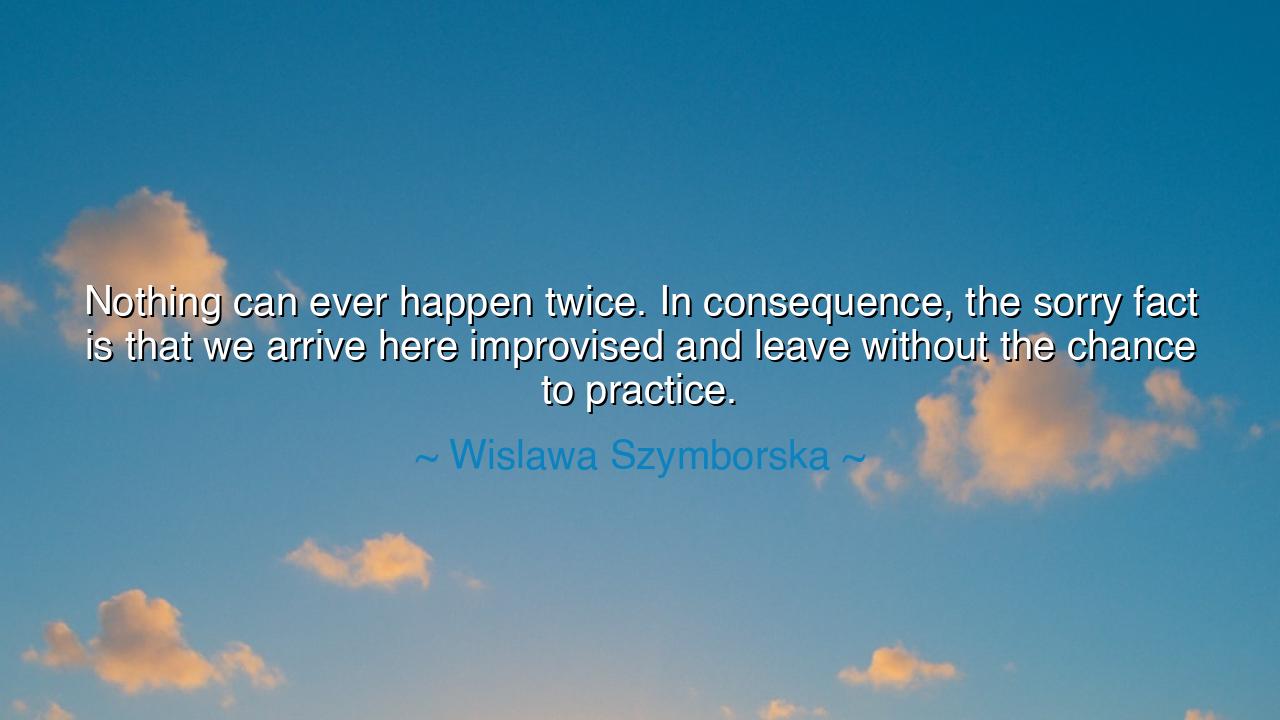
Nothing can ever happen twice. In consequence, the sorry fact is
Nothing can ever happen twice. In consequence, the sorry fact is that we arrive here improvised and leave without the chance to practice.






"Nothing can ever happen twice. In consequence, the sorry fact is that we arrive here improvised and leave without the chance to practice." These profound words by Wislawa Szymborska speak to the ephemeral and unpredictable nature of life. In them, she expresses the bittersweet reality that our time on earth is finite and unrepeatable. Each moment, once passed, cannot be recreated. We arrive in the world without the benefit of a rehearsed existence, and we leave without the opportunity to correct or refine the mistakes we’ve made. Life, in its essence, is an improvised performance, a journey marked by uncertainty and the impossibility of repetition. The regret, Szymborska points out, is not just that we make mistakes, but that we never get the chance to perfect them before time runs out.
In the ancient world, the concept of impermanence was ever-present, and the idea that life’s course cannot be repeated was embedded in the minds of philosophers and poets alike. Heraclitus, the Greek philosopher, famously stated, "You cannot step into the same river twice." This illustrates the fluidity of time, where even the most seemingly consistent elements of our world are always in motion, always changing. Just as the river is never the same from one moment to the next, neither are we. Our lives, like the river, flow forward, and while we can gaze at the water and see familiar patterns, we can never truly recapture what has passed. For Heraclitus, the lesson was clear: change is the only constant, and the opportunity to recapture the past is but an illusion. Szymborska’s words echo this ancient wisdom, reminding us that life’s fleeting nature demands that we embrace each moment, for it can never be relived.
Similarly, the Romans grappled with the fleeting nature of life in their reflections on fate and destiny. The poet Horace, in his famous work Carpe Diem, urged readers to "Seize the day, putting as little trust as possible in the future." He understood that the future is uncertain and that we are given only the present to act, to shape, and to experience. In this context, Szymborska’s thoughts on life’s improvisation resonate deeply with the Roman worldview. We may wish for the chance to practice or redo moments, but life provides us only with the present moment, which is both a gift and a source of regret. Thus, Horace’s advice was not merely to live recklessly, but to recognize the preciousness of time and the urgency of action in the face of life’s impermanence.
Consider the story of Alexander the Great, whose life was marked by bold actions and unrelenting ambition. Alexander sought to conquer much of the known world, and though he achieved monumental success, he was always in pursuit of more. Yet, his untimely death at a young age left him with little time to fully realize or consolidate his empire. One of the most tragic aspects of his death was the fact that, in the end, he could not practice what he had spent his life seeking—peace, stability, and a lasting legacy. Alexander’s death underscores the improvised nature of his existence; he lived with the knowledge that time was limited and that every decision had immense consequences, yet he was not granted the time to perfect his vision. His story is a vivid reminder of the shortness of life and the unfinished nature of even the most ambitious endeavors.
In modern times, we see this same struggle in the lives of those who reach the pinnacle of success only to realize that the time for reflection or revision is limited. Take, for example, Steve Jobs, who co-founded Apple and revolutionized technology. Jobs was known for his relentless pursuit of perfection in his products, yet his untimely death at the age of 56 left him without the opportunity to see the full legacy of his work unfold. While Jobs made an indelible mark on the world, his passing reflects the reality that no matter how hard we strive, time does not wait for us to perfect our actions or ideas. In a way, Jobs, like Alexander, faced the cruel truth that life is a one-time performance—we arrive unprepared, and we must make the most of every moment.
The lesson that Szymborska offers is one of acceptance and awareness. Life cannot be perfected or replayed, and the regrets we feel often come from our awareness that we do not have the luxury of time. We must live as if every moment matters, as if the chance to practice our craft, our relationships, and our passions is precious. The key to living fully, then, is not in waiting for the perfect moment or the chance to redo our mistakes, but in embracing the present and committing to making it meaningful, regardless of the outcome. Just as the ancients taught, wisdom lies in accepting the impermanence of life and using our time wisely, knowing that it will never come again.
In practical terms, this means letting go of regret and the desire for perfection. Instead, we must focus on the opportunities before us, recognizing that each moment—no matter how imperfect—is a chance to grow, to learn, and to shape our lives. The future may not unfold as we expect, but if we approach it with intention and awareness, we will live without the haunting feeling of might-have-beens. Let us not wait for the chance to practice life, but instead, embrace each moment with the knowledge that this is the only moment we are truly certain of. By doing so, we can face the unknown with courage and live without regret, fully engaged in the beautiful improvisation that is our existence.






AAdministratorAdministrator
Welcome, honored guests. Please leave a comment, we will respond soon